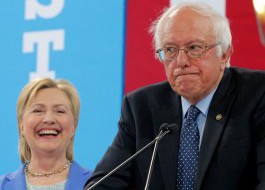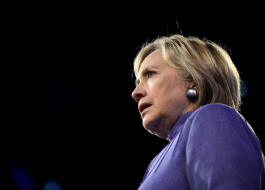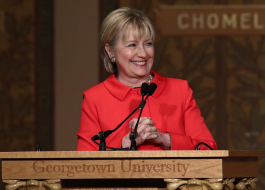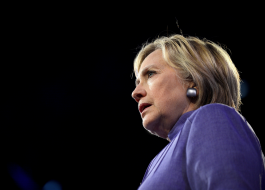 Skye Gould/Business Insider
Skye Gould/Business Insider
Education policy has largely been a second-tier issue in the 2016 presidential election.
Democratic presidential nominee Hillary Clinton has focused her discussion mostly on issues like the economy, national security, while briefly touching on college affordability.
And in the first presidential debate, there was no direct discussion of education policy proposals.
Still, she has given some indication about the issues she would back in the White House.
Here's where Hillary Clinton falls on the big education issues.
 Skye Gould/Business Insider
Skye Gould/Business Insider
School choice
Clinton, unsurprisingly, is staunchly opposed to school vouchers, an issue that is cleanly split along party lines. GOP policymakers traditionally favor school choice, while Democrats claim it hurts public education. Clinton asserted this point in a message she posted to her website after Trump unveiled a plan to increase school choice across the nation.
"Trump's proposal to apparently gut nearly 30 percent of the federal education budget and turn it into private school vouchers would decimate public schools across America and deprive our most vulnerable students of the education they deserve," Clinton wrote.
Opponents of voucher programs argue that they siphon essential funding from already meager public-school budgets to other schools and at their worst are unconstitutional, as they can use taxpayer-funded vouchers to benefit religious schools. Supporters argue that vouchers help disadvantaged students.
"Voucher programs largely help low-income middle-class kids — these are the kids that most need access" to quality education, Michelle Tigani, the communications director at the Center for Education Reform, previously told Business Insider.
Voucher policies typically have income restrictions that vary by state to ensure education funds truly end up with the families most in need.
On the issue of charter schools, Clinton treads carefully. Charters, which are publicly funded but privately run, are scorned by teachers unions — a constituent that has endorsed Clinton. The American Federation of Teachers, another teachers union that has endorsed her, also opposes school-choice policies. A supporter of charter schools since the 1990s, she has faced backlash from these groups.
At an event for the National Education Association, the largest teachers union in the US, Clinton spoke positively about charter schools and was interrupted with boos.
Common Core
 An Albuquerque High School student who was among hundreds of students to stage a walkout to protest a Common Core test they said wasn't an accurate measurement of their education. AP Photo/Russell Contreras
An Albuquerque High School student who was among hundreds of students to stage a walkout to protest a Common Core test they said wasn't an accurate measurement of their education. AP Photo/Russell Contreras
Though Clinton does support Common Core and the concept of national standards, she doesn't talk about it often. That's likely because the Common Core has grown so universally unpopular on both sides of the aisle.
Instead, Clinton has focused on the issue of universal preschool, as a way to ensure students in primary school and beyond receive adequate education to help the US compete on a global scale.
"Now, building an economy for tomorrow also requires investing in our most important asset, our people, beginning with our youngest," she said at a campaign event in New York City. "That's why I will propose that we make preschool and quality childcare available to every child in America."
College tuition

Clinton's most vocal education agenda item is her college tuition plan.
"I'm a little different from those who say free college for everybody," she said on NBC's "Today" show in 2015. "I am not in favor of making college free for Donald Trump's kids. I am in favor of making college free for your grandson by having no-debt tuition."
Clinton's plan would make tuition at four-year public colleges and universities "debt free" and would be calculated based on family income. Clinton's proposal starts by making public college free for families that earn $85,000 or less annually, gradually lifting the threshold up to families that earn $125,000 a year by 2021. Community college would be free for all students, and interest rates on student loans would be decreased.
Clinton's plan would also allow students to refinance student debt at current rates and would lower interest rates on future loans. Clinton previously proposed spending $350 billion over 10 years for the plan, and has moved that estimate up to $500 billion, in part by cutting tax deductions for high-income Americans.
One criticism of her plan is that the specifics are lacking and it's unclear how she will make the plan a reality.




